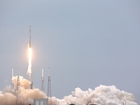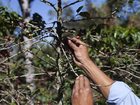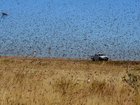The commercial cargo ship Dragon returned to Earth from the International Space Station on Sunday, bringing back nearly 2 tons of science experiments and old equipment for NASA.
SpaceX's Dragon splashed into the Pacific, just five hours after leaving the orbiting lab.
 Full Story
Full Story
Objects that crashed to the ground in China have been identified as space debris, state media reported, after a Russian rocket carrying a communications satellite fell back to Earth minutes after lift-off.
Qiqihar city in the northeastern province of Heilongjiang, which borders Russia's far east, reported that several objects appeared to have fallen from the sky on Friday, the Xinhua news agency said.
 Full Story
Full Story
The U.S. government is stepping up efforts to help Central American farmers fight a devastating coffee disease — and hold down the price for a cup of coffee.
At issue is a fungus called coffee rust that has caused more than $1 billion in damage across Latin America. The fungus is especially deadly to Arabica coffee, the bean that makes up most high-end, specialty coffees.
 Full Story
Full Story
The choppers swoop in, dumping insecticide over a plague-stricken village in Madagascar's stunning central highlands.
"The goal is to break the invasion," explains Tsitohaina Andriamaroahina, head of a U.N. mission to end a locust plague threatening the crops of 13 million farmers on this island nation.
 Full Story
Full Story
Paleontologists in Argentina's remote Patagonia region have discovered fossils of what was likely the largest dinosaur ever to roam the earth.
The creature is believed to be a new species of Titanosaur, a long-necked, long-tailed sauropod that walked on four legs and lived some 95 million years ago in the Cretaceous Period.
 Full Story
Full Story
A Delta 4 rocket has lifted off from Cape Canaveral carrying a GPS satellite.
The United Launch Alliance rocket that soared into space Friday will place a navigation satellite into the Global Positioning System constellation for the Air Force. This is the sixth such satellite deployed by the Air Force.
 Full Story
Full Story
A teenage girl who fell into a hole more than 12,000 years ago in Mexico's Yucatan Peninsula is offering new clues about the origins of the first Native Americans, researchers said Thursday.
Named "Naia" by scientists, her skeleton is among the oldest known and best preserved in the Americas.
 Full Story
Full Story
Dinosaur fossils found in Patagonia provide the first evidence that long-necked, whip-tailed diplodocid sauropods survived well beyond the Jurassic period, when they were thought to have gone extinct, Argentine paleontologists said Thursday.
Pablo Gallina, a researcher at Buenos Aires' Maimonides University, described the find as the first definitive evidence that diplodocids reached South America, and the most recent geologic record of this branch of sauropod anywhere.
 Full Story
Full Story
Ecuador declared an environmental emergency in the Galapagos Islands Thursday, after a freighter carrying pollutants ran aground last week.
The measure will free up resources to remove the ship and mitigate its impact in the face of "possible environmental damage that could unleash a disaster" said the Directorate of the Galapagos National Park (DPNG).
 Full Story
Full Story
A Russian Proton rocket carrying a European-built satellite fell back to Earth on Friday shortly after liftoff in the latest accident to hit the country's once-proud space industry.
Russian space officials said the rocket's control engine failed 545 seconds after it took off from the Baikonur space centre that Moscow leases in Kazakhstan.
 Full Story
Full Story



